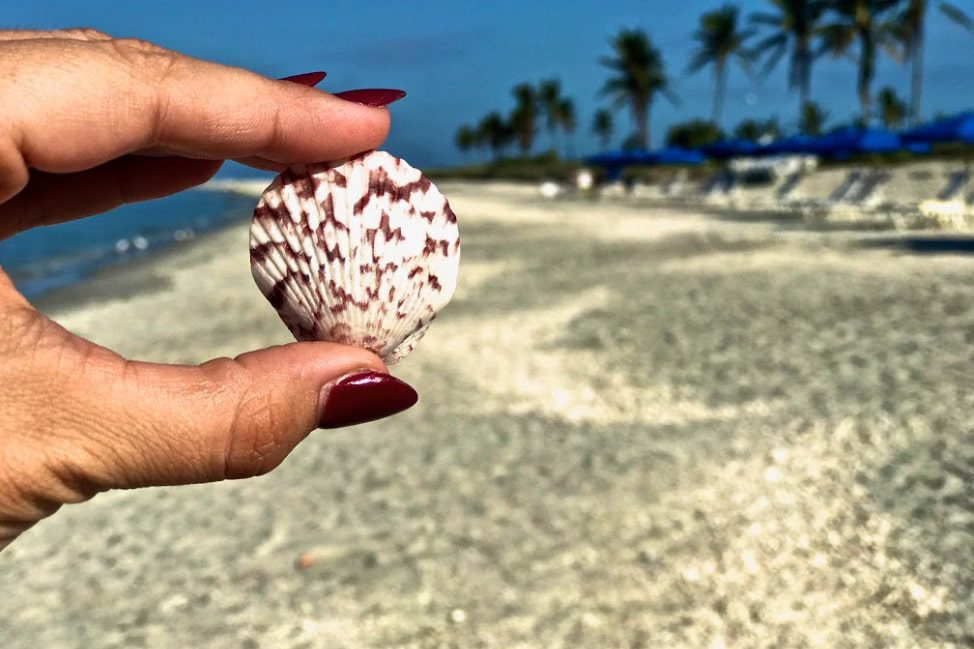Great question. How do you handle stress?
Those of you who’ve been with me since I first started blogging in 2006 probably remember my wild, sleepless, workaholic days as a publicist in NYC. I had so much fun in those five years that I basically had to evacuate my entire life for a year to chill out.
Well, that was the plan. Living out of a suitcase, switching hotels every few nights, flying around the world, meeting hundreds of new people and launching my own business along the way was a lot less relaxing than anticipated. Was it fun? So much fun. Was it successful? Absolutely. I’m still here and my career is going better than ever.
But was it healthy? Not so much.
I used to live by the motto, “You can sleep when you’re dead.”As a publicist, I could always be counted on to go from project to project, coast to coast, country to country, with no breaks in between, missing weekends, working on every vacation I ever took and making it look pretty easy. Ages ago, I wrote a whole post about how FOMO ruled my life. I did not have an OFF switch.
My job was so fun and glamorous and perfect for me, and traveling has always been such a passion, that the need for rest and self care was always just something I ignored. The biblical idea of the Sabbath felt like a suggestion for people who actually had time for it. I never considered that rest was important enough to God that it was included in the Ten Commandments. Right up there with not killing people.
I really thought I could just continue at that breakneck pace until I was 85 or so, and then I could check into some swanky retirement village for insane old publicists and just flip the switch from ON to OFF.
And then the past couple of years hit me like a ton of bricks. I found out I actually am a real human with real limitations. I learned that burnout was real, and prolonged health is not guaranteed. Everything changed. It had to.

I went hard when I lived in NYC. I went hard on my two years of solo travel around the world. And it wore me out in ways I didn’t see coming. There are many of us who started blogging 10+ years ago who are finding our 30s and 40s to be professionally great, and yet our bodies are betraying us. I can no longer stay out all night singing karaoke, then travel for three days, then walk 65 miles and churn out four blog posts a week. I will die.
I recently shared a peek into my current health struggles. Last year, due to a mix of outside stressors and just not taking care of myself, I dealt with a months-long bout of anxiety attacks in addition to chronic pain and all sorts of other maladies. For someone used to staying too busy to eat, much less to slow down and take stock of my health, it was a real punch to the gut and a wakeup call. And rather than reaching for medication, I decided to get to the bottom of why I was suddenly panicky and out of control, seemingly for no reason.
WHAT CAUSES STRESS?
According to stress expert Heidi Hanna, PhD, we are in a human energy crisis.
“Chronic multitasking and ever-increasing demands on our time and energy have caused a neurochemically based depended on sources of stress and stimulation to provide fuel for our chaotic lifestyles.” – Heidi Hanna, Stressaholic
I’ve read the whole book, and Heidi has me pegged. I’ve become addicted to stress. What used to be a healthy fight or flight response in my body has turned into chronic fight. There’s no down time, no relaxation – and that’s no bueno. That’s how I ended up where I am, fighting chronic inflammation.
Inflammation is part of the immune system’s response. When the body is in balance, it helps to fight infection and keep us healthy. It’s chronic inflammation that causes us problems and, according to scientists, a whole host of diseases from diabetes to Alzheimer’s to cancer to autoimmune disease.
Dr. Hanna is realistic about stress in her book. The fact is, we’ll never be able to get rid of all stressors. Life is bananas as you well know. But if we can learn to retrain our brains to react more positively, that’s how we can use stress to our benefit.
First things first, it helps to have a keen self awareness, and I think knowing how you’re wired goes a long way.
A few top personality tests to get you started:
Whether you’re a fellow Obliger, HSP, ESFJ, Enneagream 1/3, Words of Affirmation empath who knows what it’s like to constantly feel your feelings and everyone else’s, or a cool, unflappable cucumber like my hubby, unaddressed, chronic inflammation will ultimately stop you in your tracks. Could be in your twenties, or it might not hit until your sixties. But it will eventually do a number on you.
If you’re overscheduling life, burning the candle at both ends, eating fast food on the go and drinking caffeine just to stay alive, that’s a bad, bad sign for anyone, and no sustainable way to live.
And who hasn’t been there? Our culture rewards those who put the pedal to the metal, but at what cost? Admiration, professional success, accolades and money are all fabulous, but if you’re immobilized at 30 because you broke yourself in the process? What good is it all?
If we can find a way to reduce inflammation, we go a long way toward staying healthier longer. They say an ounce of prevention is worth a pound of cure, and if all of these little steps to reduce anxiety, stress and inflammation add up to a pound of prevention, just imagine how much cure that’s worth? (I’m getting inflamed just thinking about this as a word problem.)
I reached a point in the past couple of years where I had to ask myself, am I going to hold on to the way I’ve always done things and kill myself for it, or am I going to do the hard work of rewiring my brain and learning a new way of relating to the world?
PIN ME FOR LATER
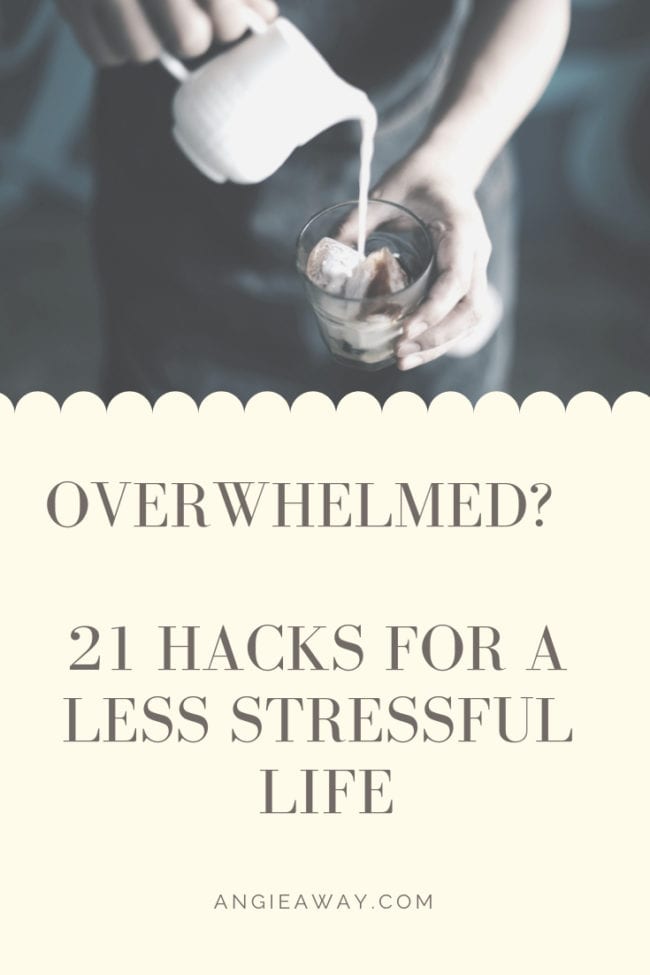
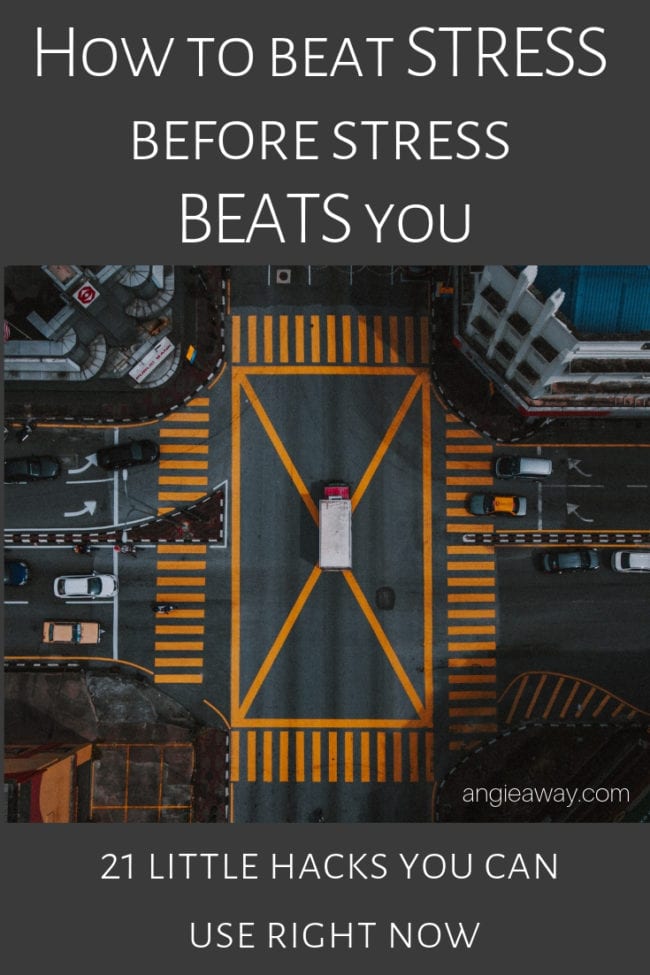
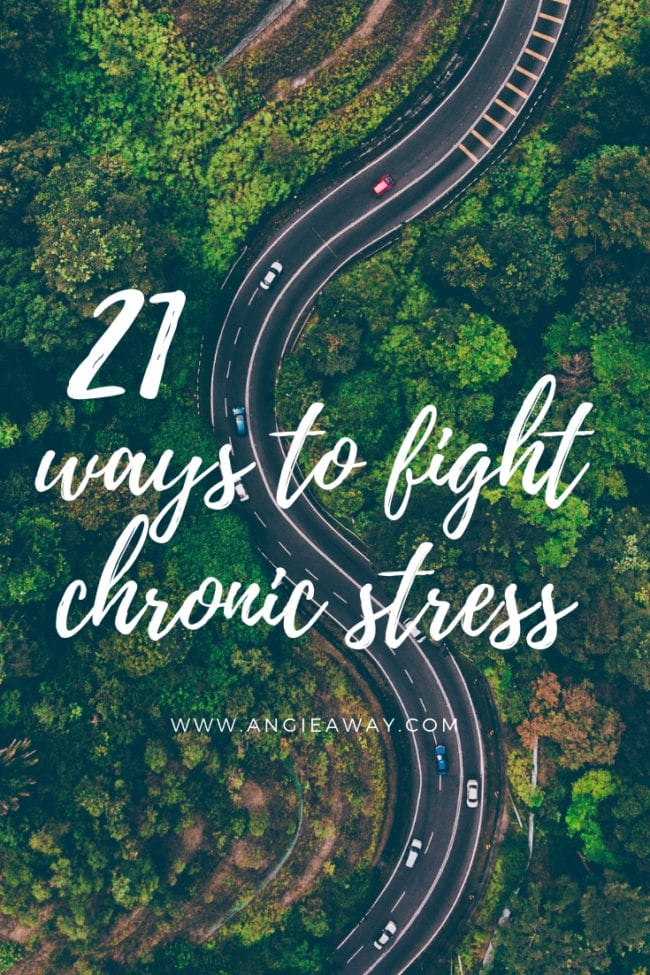
21 Tips for the Chronically Stressed and Overstimulated
CULTIVATE A HEALTHY “DIET”
1. Don’t go on a “diet.”
Whatever you do, don’t go on a traditional diet! Diets are temporary. Diets are up and down. I’ve dieted since I was 6 years old. Isn’t that sad? I’ve lost weight only to find it again not long after. I have clothes in my closet spanning 10 sizes. That’s not healthy for the body, and switching back and forth from unlimited sugar and caffeine to minimal calories and steamed vegetables for years and years takes its toll.
The lack of consistency in my diet has lead me to be a very mean, unstable person at times. When I get too busy working to stop for lunch, by the time I eat, my blood sugar is all over the place and I become a very scary, anxious woman. Rick isn’t afraid of much other than Hangry Wife. I’m terrifying!
Nowadays, I’m doing my best to follow the Autoimmune Protocol, or AIP. It’s basically a more intense Whole 30. All whole foods, nothing processed. It’s restrictive when it comes to the top inflammatory foods – sugar, artificial sweeteners, soy, dairy, gluten, grains, legumes, nuts, alcohol and eggs. And everything is organic, at least as much as possible. But it’s not a temporary fix. Based on my current health issues, eating this way as often as possible is making a huge difference and hopefully preventing whatever I have going on from progressing. Diet is the one thing I can control (at least most of the time!) that is directly affecting my health, so I am taking responsibility more than ever to to eat along this anti-inflammatory protocol.
What I’ve learned about diet, same as personality, is that everyone is wired differently. Where some people can eat straight garbage and maintain a healthy physique, others could eat the same thing and be driven into an anxious hole that it’s very difficult to climb out of. My brother lives on a steady diet of Hawaiian Punch, Gushers and cereal and looks like Patrick Swayze in Point Break. If I did that, I’d no doubt have to be institutionalized.
The bottom line: eating is one thing that’s almost completely within your control. Eat well. Start now. Your mind and body will thank you.
2. Quit caffeine.
I imagine half the people reading will click out of this article now in protest. HEAR ME OUT. Caffeine is not for everyone. I suspect, based on my own family history and personal experience, that caffeine addiction causes a huge portion of America’s anxiety. I’m a slow caffeine metabolizer, which means I have to be super careful about how much caffeine I take in or risk all sorts of health ailments, from panic attacks to heart attacks. Switching to decaf or just herbal tea has made a big difference for me.
3. Rest. For real.
I always felt like the way I’d structured my post-NYC life was a luxury. After all, I make my own schedule and choose the projects I work on… so technically, I should be able to handle it all, right?
I’ve learned rest is something you have to choose to do, especially when you’re hard-wired to do it all and you own your own business.
Rest can’t just be on the weekend or on an occasional vacation. Rest and recharging time should be as much a priority in your daily schedule as work. Factor in time to your day to recharge – prayer, stretching, coffee, thinking, quiet time, boredom. I am the worst about this, because I am so wired for mental stimulation, I don’t even know what to do with myself if there’s no WiFi. But this intention matters more than we can ever imagine. Switching off your brain frequently helps turn off inflammation; it’s a practice that could literally save your life.
Practical tips for scheduling rest into my day include notifications on my Apple Watch (bought on a whim and now it’s my No. 1 way of sticking to my de-stressing rituals!) to do deep breathing exercises a couple times a day as well as hourly “stand up” notifications. These prevent me from hunching over my computer for 10 hours at a time without getting up. I try to make sure I eat lunch away from my desk, too. It doesn’t always happen, but it makes a difference in the rhythm of my day if I factor in more time to decompress periodically vs. saving it all up for 7 p.m.
4. Guard your heart.
Diet is so much more than what you eat. Everything you consume – food, music, TV – informs your body on a cellular level on how to act and react. Guarding your heart is a biblical principle that works whether you follow Jesus on Twitter or not.
The gist? What you consume matters.
It might not affect you in the short term, and again it has much to do with how you’re wired, but what you listen to and what you watch gets into the core of who you are, and eventually spills out of your mouth and infects your cells. Consumption has a cumulative effect, so in the same way excessive sugar won’t likely give you cancer TODAY, if you eat it every day for 30 years, you eventually will run into health problems. If you watch a ton of violence, eventually there will be effects. Heck, watching a ton of rom-coms can distort your views of love and romance.
How to Take Control of Your Diet Without Dieting
In the past six months, we’ve made a real effort to eat better, but I can’t tell you how often I forget to plan a meal! And then we’re starving and the closest restaurant to us is Chick-Fil-A. Can you turn down waffle fries and Polynesian sauce? I cannot.
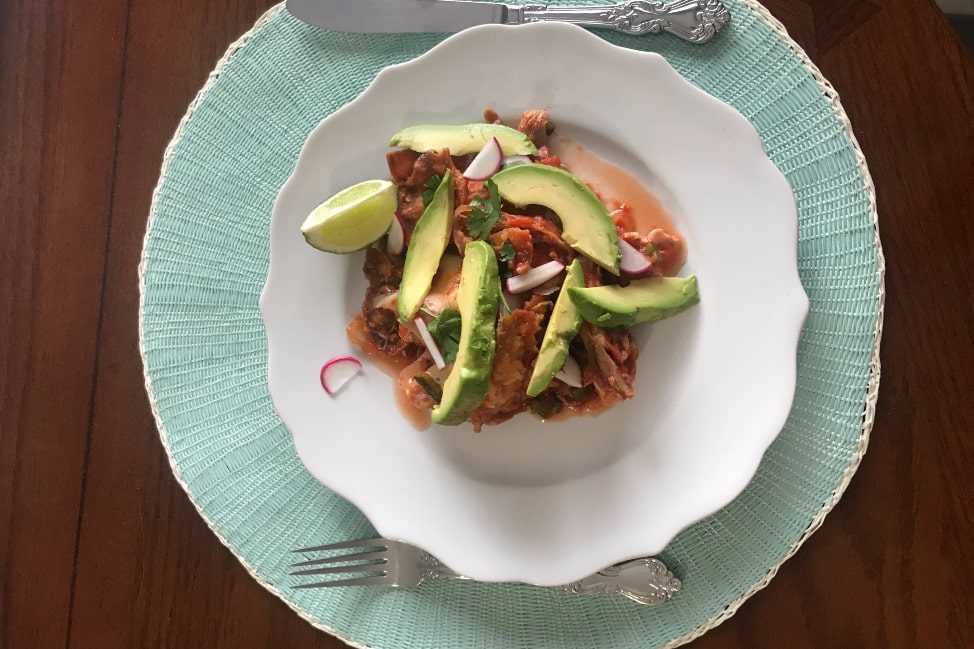
So planning ahead for the week’s food, usually on Sunday afternoons, has become a real key to maintaining our healthy diet. We mix it up with:
Meal kits
If you enjoy cooking but find it hard to do the planning and shopping, meal delivery kits are a great way to avoid some of that stress and cut right to the fun part. We experimented with Plated last year and I absolutely loved it! I’ve never loved cooking – I’m more into the eating and I HATE the cleanup – but I found with everything portioned out, it was more fun than anticipated. Everything we’ve cooked has been delicious, and I’ve modified multiple recipes to be AIP friendly and cook them now on my own all the time. (Click through for a special deal from Plated.)
Ready-to-eat meal delivery
We use Kathy’s Table here in Jacksonville for gluten and dairy free meals. The price is reasonable, something like $100 for 10 Paleo meals, and it works great on weeks when we’re too busy to cook or when I’m out of town and don’t want to leave hubby to his own devices. (He ends up at Arby’s 75% of the time, I’m not kidding.)
Grocery delivery
When I am in town all week and can actually devote time to cooking, I usually order my groceries on Shipt. It saves me time at the store, I can sit with a cookbook and just drop ingredients into my iPhone cart as I peruse AND I don’t toss impulse items (looking at you, pudding cups) into the cart. This has been the single best way of reducing junk food in the house. If I don’t see it in the store, I’m not tempted to buy it. (Wanna try Shipt? Use code mG9PS to save $50 on an annual membership.)
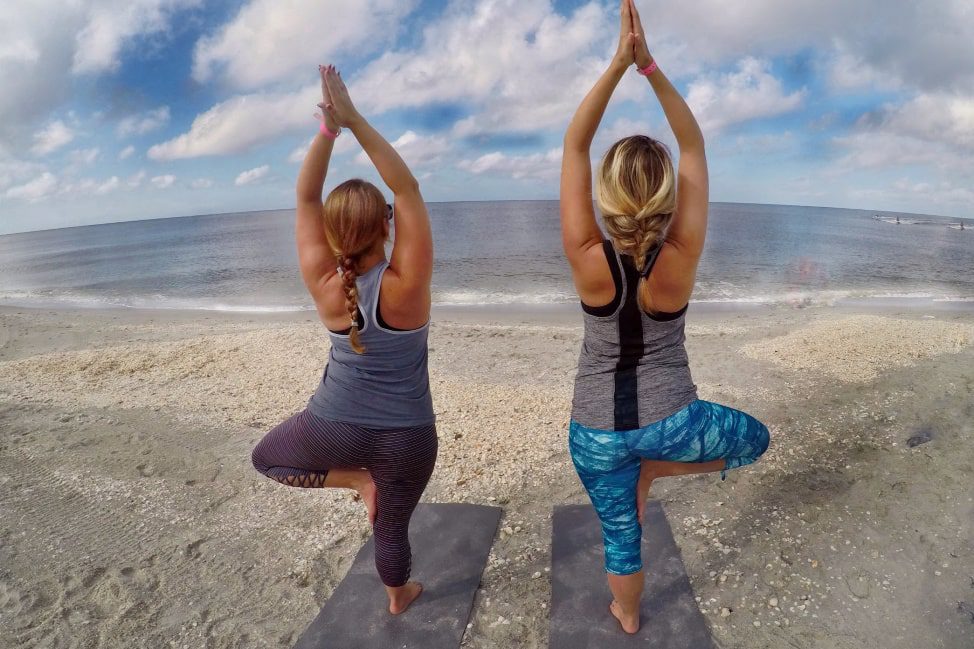
MENTAL HEALTH & SELF CARE
1. Start your day on the right foot.
How you start your day is everything. On the days where I wake up and go straight to my computer, I feel frazzled and hijacked by what everyone is demanding from me. When I wake up, make tea, meditate, pray, do a few pages in my Bible study and stretch, it sets an intention for the whole day. I’m much less easily frustrated and even though it takes me a bit longer to get to work, I feel like I have more time than if I just dove right into the day’s tasks.
If left to my own willpower, it’s all to easy for me to skip my morning intentionality, so I use the Calm, Headspace and Abide apps to guide me into a good start.
2. Invest in self care.
What does that mean? It means massages are not a luxury if they keep you healthy. For far too long, I let my pain go untreated because I had no real diagnosis, and I always thought massage was a special occasion thing. And yet, whenever I get one, it helps me in 100 little ways. This could go for chiropractic, acupuncture, therapy, H20M, yoga or a gym membership. Those things have always felt like an extra, but in reality, cable TV, Starbucks and expensive dinners out are optional, and self care is not.
3. Exercise intentionally.
For far too long, exercise to me meant working out until I was just about to die and then clawing my way back from painful injuries, only to do it all over again. This is not the point of exercise. You do not have to run a marathon for it to count. You do not have to have a six-pack for exercise to be meaningful.
It’s getting the body moving enough to create endorphins to counteract inflammation. For me right now, all I can do is walk, do gentle yoga and swim now and then. But I feel better than I have in a while and it’s because I’m not forcing myself to go to seven intense fitness classes a week like I did when I lived in New York. If you can do that and you feel good, then by all means, Soul Cycle your way to health. But don’t feel guilty if you’re not there, or shamed into doing nothing.
4. Boundaries are a must.
As an HSP, I am sensitive to lots of stuff. And it’s not just, “Oh, you hurt my feelings.” But sounds, lights, crowds, yelling, confrontation affect me deeply. Political news shows are out, scary movies are a no-go and haunted houses? Not even if I’m getting paid. Not for all the peer pressure in the world.
I know myself and I know what works for me, so I’ve learned not to apologize for taking care of myself. Not everyone understands and that’s ok, but I’m not going to send myself into a stress loop to make others comfortable. That means if I’m feeling overwhelmed, I Irish goodbye out of a fiesta and go back to my hotel room for a bubble bath and silence. Or if I know things are going to be busy, like last week in NYC where I barely slept, ate or stopped talking, I spent the week prior meditating a bit more, preaching the word to myself a bit more and reflecting a bit more.
5. Eliminate decision fatigue with outsourcing and automating.
When I was in the throes of my weird anxiety attacks last year, having to decide what to eat or what to wear became a daily challenge. I spent some time figuring out how to cut down on the number of decisions I have to make it a day, and I began to outsource and automate wherever possible.
Shopping. I hate shopping and it fills me with dread, but my career means I often have to show up on TV and at conferences looking like I own more than pajamas. So services like Rent the Runway, LeTote and Stitch Fix are lifesavers. It saves me a trip to the mall and I get so many more options than just the boring stuff I’d pick out for myself.
House cleaning. For the longest time, I felt like keeping house was just this big responsibility that fell on me. Rick doesn’t really care too much what the house looks like. He’s happy to pitch in, but in his own time… and as I think I’ve mentioned several dozen times, I’m Type A, so that doesn’t fly. We started hiring a house cleaner last year and it was literally the best money I’ve ever spent. It saved me 8 hours of scrubbing, probably more because our gal is efficient, and we don’t have to fuss over whose turn it is to clean the bathrooms.
Meal delivery. If that’s what it takes to eat healthier and make sure you don’t binge on fast food, then it’s worth it. See above for suggestions.
6. Therapy.
I grew up in a family where therapy was for crazy people and WE ARE NOT CRAZY. Well, thank goodness for therapists who helped untangle that nonsense! It’s been a long time since I’ve been to my counselor, but every so often I pop in for a reset and it’s always, always a game changer.
If you’re weirded out about meeting with someone in person, check out these online services:
7. Set the bar lower.
How scary is this for a Type A overachiever to say?! I’m the queen of 100-item to do lists. That also means I set myself up to fail almost every day. I’m never going to get everything done that I want to, so setting smaller and more manageable goals is helping me to be a human being with work-life balance instead of PR-robot with a caffeine drip.
A new goal for this year, instead of WRITE A BOOK, is “Write two crappy pages per day.” Write a book is way too large and unwieldy a goal, but I can certainly manage two unedited pages of word dump every day. Eventually, that’ll become a book, and I won’t have to feel like I’m not getting anywhere with my goals.
8. Stop being such an a-hole to yourself.
Funny timing on this story. I’ve been working on it for weeks, and just this past Sunday our sermon was about how much words matter. Particularly for word people like me, but for everyone, and it’s not just what others say, but what you say to yourself. No one affects you more than you, so be nice to yourself. I mourn for the years of my life I’ve wasted worrying about what I look like, how much I’ve achieved, etc.
Stop shaming yourself because you can’t do it all. You’re not supposed to do it all.
9. Lean on your people.
This is one of the hardest ones for me! It took me a long time to be able to distinguish real, true friends from acquaintances. I’m generally a pretty open book and connect easily with strangers, but when the chips were down, I looked around my Facebook feed and found very few folks I could turn to for real help. The past year has been an eye opener in that department, but I know who’s in my tribe now and who I can lean on. Jane Austen said, “Friendship is the finest balm for the pangs of disappointed love.” Friendship as a healing balm is such a sweet thought, isn’t it? Works for all sorts of pangs, too.
10. Reframe the negatives.
“I have to do the dishes.”
“I have to cook dinner.”
“I have to go shopping for Christmas presents.”
All tasks I “have to” do. And yet, when I’m feeling overwhelmed and extra negative, if I can tell myself, “I get to go Christmas shopping and so many people don’t,” or “I get to cook dinner with my hot husband,” then somehow the “have to” becomes something that I get to do. It’s a simple tweak, but it helps.
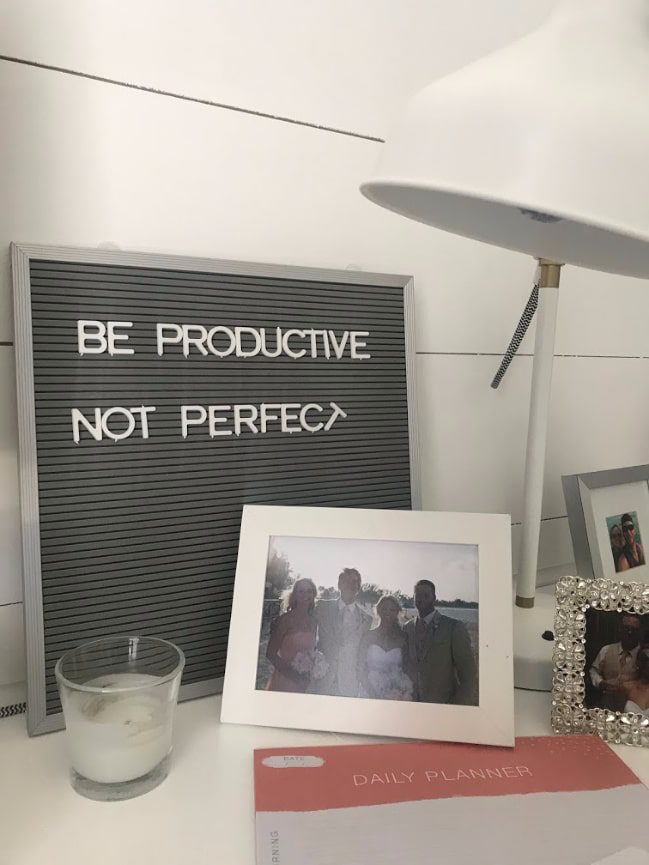
INTENTIONAL CONNECTIVITY
Wouldn’t it be nice to cut out social media altogether? I have been wishing I could do that for years, but considering my profession, I live online and unless I switch careers, it is what it is. But with a few tweaks, I’m making my way in the world of careful, thoughtful online citizenship. For starters, I’ve been using my iPhone’s Screen Time function to monitor how much time I am spending on social. I set a daily time limit of two hours for social networking apps. That may sound like a lot to those who don’t live and work on social media, but for me, staying below two hours a day would be a miracle. I’ve yet to hit the goal, but now that I’m more aware of it and I get a notice when I reach that limit and make more intentional decisions. Like more business, less mindless scrolling on Twitter and Instagram.
1. Turn off notifications on your phone.
Everyone in my contact list cannot have unrestricted, 24/7 access to my brain. I’m wired to be a helpful resource and a communicator, but too often I have reached the end of my capacity and still the requests pour in with demands, expectations for instant response and rarely a thank you. Every question about blogging or real estate or dog shows or travel writing or public relations cannot be my emergency, no matter how much I love to teach and share what I’ve learned. And it has taken years to give myself permission to not be everyone’s Google search bar. I now have a very small list of folks who I respond to on demand, and for my own sake, it has to be this way.
There’s an element of fear that I had to overcome in turning off notifications. I’ve been so scared for so long that every phone call could be “the” phone call – either an epic opportunity I might miss or a life-shattering emergency – that I have become tethered to my iPhone in an unhealthy way. Interesting to note: no one has complained or even noticed that I’ve made the changes, and I’ve yet to miss a phone call so important it couldn’t wait.
2. Do your stuff first.
I never thought I’d be quoting Ashton Kutcher’s advice – he’ll always be the goofball from That 70s Show in my mind! – but I read a fantastic article about how he approaches his inbox and it’s really stuck with me. Rather than waking up and diving in to all the requests people have for him, he actions his own projects first before ever reacting to anyone else’s needs. Sure, that’s not always possible, but now I find myself reminding myself that I am in fact, my own boss. I make the rules. And if I’m ever going to reach my personal goals, I can’t be beholden to every email request for free consulting or brain picking sessions. It’s so helpful to start the day on my terms.
3. Keep phone out of arm’s reach.
I’m still working on this one! Something as simple as intentionally leaving my phone in another room for a few hours makes me so much more productive because I’m not tempted to check every so often. The next step for me is to keep my phone out of the bedroom and stop scrolling in bed. It’s been my New Year’s Resolution for the past 2-3 years and I still haven’t gotten the hang of it.
4. Mute or hide inflammatory people.
You know exactly who I’m talking about. The reporters who get you riled up. The partisan political accounts. The know-it-all bloggers who are all “do as I say, not as I do.” That uncle who believes every meme and shares every 4-year-old story on the internet. Who’s that online contact who makes your blood boil?
Facebook has a wonderful feature where you can snooze someone for 30 days, or you can even stay friends and unfollow their updates altogether. You can also mute accounts on Twitter. Take advantage of these features. No one knows if you’ve unfollowed or muted them, and let me tell you, during the election, these were sanity and relationship saving measures.
5. Know your triggers.
If shouty political banter makes steam come out of your ears, consider what good it’s doing you to follow the pundits. I’m not saying that you should be ignorant of the issues, but I am suggesting that everyone is wired differently. My dear husband can watch the news all day and sleep like a baby. I can’t watch it at all unless I want to face consequences. Find the way of staying informed that works for you and does not affect your mental health.
It’s not just politics. If fashion and style bloggers make you feel less than or that you need to spend more or try harder to keep up, take a break from following them for a while. I remember when I lived in Atlanta I spent a lot of time wandering the shiny malls and shopping centers, and always feeling broke and like I didn’t have my life together because of all the stuff I didn’t have. The simple act of removing all the visual cues for what I didn’t have made all the difference. I quit reading fashion magazines back in my twenties and yes, I probably look like a wrinkly old hag in sweatpants sometimes, I am not constantly reminded of how much smoother my forehead should be.
6. Follow inspiring accounts.
The world isn’t perfect, and you can (and should) only insulate from the issues so much. Make an effort to temper your news, politics and entertainment sites with positive / funny ones at a ratio of at least 3:1.
Some favorites:
PERSPECTIVE
When all my usual de-stressing tricks aren’t working, it’s often occurs to me that I’m in my own head too much. Volunteering or doing a random act of kindness for a stranger helps me to remember that life is not all about me and my feelings and needs. There’s so much more going on in the world than what’s in my little life, and anytime I am really in the dumps or stressed, helping someone else out gives me a much needed dose of perspective.
You Cannot Heal in the Same Environment You Got Sick In.
The hardest part about disconnecting from stress addiction in time to prevent serious health issues is that once you’re addicted, it does take a concerted effort to make the change. It won’t happen just because you want it to, because it’s always going to be easier to do what you’ve always done. But the brain needs to make new neural pathways to start to take stress as a positive vs. a negative influence on the body. So where to start? I got you covered!
Books to Read about Stress & Health
Stressaholic, Heidi Hanna
Finish: Gift Yourself the Gift of Done, Jon Acuff
The Next Right Thing: A Simple, Soulful Practice for Making Life Decisions, Emily P. Freeman
Boundaries, Henry Cloud
The Upside of Stress, Kelly McGonigal
The Highly Sensitive Person, Elaine Aron
Counterfeit Gods, Tim Keller
Some of this might seem like common sense, and if you can tell me how you handle stress better, I want to know! I share these little life hacks and stress tips not because I’ve mastered them all, but because I’m trying to do better in all these areas, and I know if I’m going through something, chances are others are, too. I’ve spent the past few years wading through suggestions, trying options… and if I learned anything from childhood and G.I. Joe, knowing is half the battle.

